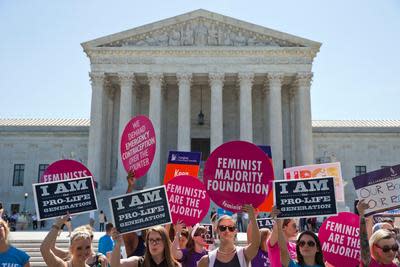Ohio's law banning most abortions remains blocked, for now
- Oops!Something went wrong.Please try again later.

A Hamilton County judge's decision to block enforcement of a state law that "largely bans abortion access in Ohio" will stand, for now, an appeals court said in an opinion released Friday.
Ohio's 2019 law banning doctors from performing abortions after cardiac activity is detected will remain on hold for at least several more months. This delays an eventual collision course with the Ohio Supreme Court, which will soon be under new Republican leadership.
In October, Hamilton County Common Pleas Judge Christian Jenkins placed the law, known as the "Heartbeat Act," on hold indefinitely, through a preliminary injunction.
The law bans doctors from performing abortions after cardiac activity is detected, which is typically around six weeks. It was in effect for about three months after the U.S. Supreme Court overturned abortion protections in Roe v. Wade before Jenkins blocked it.
Republican Ohio Attorney General Dave Yost appealed Jenkins' decision. On Friday, the 1st District Court of Appeals, in a 3-0 decision, declined to consider Yost's appeal.
The plaintiffs, including the American Civil Liberties Union and Planned Parenthood Federation of America, successfully argued that state appeals courts can only review final orders, not preliminary injunctions that preserve the status quo.
The ruling "ensures that abortion up to 22 weeks of pregnancy remains legal in Ohio," the plaintiffs said in a joint statement. "The state will fight us every step of the way but we know that Senate Bill 23 violates the Ohio Constitution, and we are confident that the law is on our side.”
The appeals court said the Yost had appealed "prematurely."
"Of course, any aggrieved party can appeal after the trial court issues its final judgment in the case," Judge Pierre Bergeron said in the opinion. "Our answer on the merits of this dispute and the underlying constitutionality of the statute … must await another day."
Yost’s office plans to take the case to the Ohio Supreme Court.“The First District Court of Appeals has erred as a matter of law. We will seek review by the Ohio Supreme Court,” Yost spokeswoman Bethany McCorkle said Friday.
Kellie Copeland, executive director of Pro-Choice Ohio, called the decision "good news" for people seeking abortions in Ohio and those who provide them.
Ohio Right to Life President Mike Gonidakis sees the ruling as a temporary delay.
“Regardless of what transpires at the lower courts, Ohio’s heartbeat law will ultimately be decided by the Ohio Supreme Court in 2023," Gonidakis said. "We are confident that Ohio’s highest court will rule that nowhere in Ohio’s Constitution does a right to an abortion exist.”
This article originally appeared on Cincinnati Enquirer: Ohio's law banning most abortions remains blocked, for now
